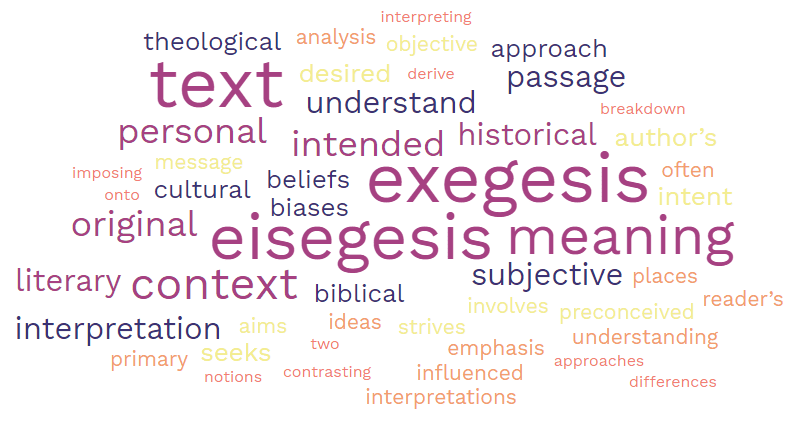
National Association of Christian Ministers Summary Series: Theology
Exegesis and eisegesis are two contrasting approaches to interpreting a biblical text. While exegesis aims to derive the intended meaning from the text itself, eisegesis involves imposing personal biases, beliefs, or preconceived notions onto the text. Here’s a breakdown of the differences between exegesis and eisegesis:
Exegesis:
1. Meaning-based: Exegesis focuses on extracting the meaning and intended message from the text by analyzing its historical, cultural, literary, and theological context.
2. Objective approach: Exegesis strives to be objective and seeks to understand the original author’s intended meaning and the original audience’s understanding.
3. Text-driven: Exegesis places the primary emphasis on the text itself and uses tools such as linguistic analysis, historical research, and literary study to interpret the passage.
4. Grounded in context: Exegesis considers the historical, cultural, and literary context of the passage to ensure accurate interpretation.
5. Respectful of authorial intent: Exegesis seeks to understand the author’s intended meaning within the broader biblical framework and theological context.
Eisegesis:
1. Subjective interpretation: Eisegesis involves reading personal biases, beliefs, or preconceived ideas into the text rather than drawing meaning from the text itself.
2. Biased approach: Eisegesis can be subjective, influenced by personal opinions, theological frameworks, or individual agendas.
3. Reader-driven: Eisegesis places the primary emphasis on the reader’s interpretation and subjective understanding, often using the text to support pre-existing beliefs or ideas.
4. Disregards context: Eisegesis may overlook or downplay the historical, cultural, and literary context of the passage, focusing more on personal perspectives or desired interpretations.
5. Imposes meaning: Eisegesis tends to impose or read into the text a desired meaning, often leading to a distortion of the original intent of the passage.
In summary, exegesis strives to understand the meaning of the text based on careful analysis of its original context, while eisegesis inserts personal interpretations or biases into the text. Exegesis aims to uncover the author’s original intent, while eisegesis may be influenced by the reader’s subjective perspective or desired meaning. Exegesis is generally considered a more reliable and responsible approach to biblical interpretation, as it seeks to faithfully understand and convey the intended message of the text.





